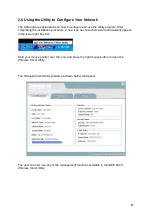
4
Chapter 1- Wireless LAN Networking
This section provides background information on wireless LAN networking technology.
T
HE INFORMATION IN THIS SECTION IS FOR YOUR REFERENCE.
C
HANGING
NETWORK SETTINGS AND PARTICULARLY SECURITY SETTTINGS SHOULD ONLY
BE DONE BY AN AUTHORIZED ADMINISTRATOR.
Transmission Rate (Transfer Rate)
The adapter provides various transmission (data) rate options for you to select. Options include
Fully Auto, 1 Mbps, 2 Mbps, 5.5 Mbps, 11 Mbps, 6 Mbps, 9 Mbps, 12 Mbps, 18 Mbps, 22 Mbps, 24
Mbps, 36 Mbps, 48 Mbps, 54 Mbps and up to 300Mbps. In most networking scenarios, the
factory default Fully Auto setting proves the most efficient. This setting allows your adapter to
operate at the maximum transmission (data) rate. When the communication quality drops below a
certain level, the adapter automatically switches to a lower transmission (data) rate. Transmission
at lower data speeds is usually more reliable. However, when the communication quality
improves again, the adapter gradually increases the transmission (data) rate again until it reaches
the highest available transmission rate.
Types of Wireless Networks
Wireless LAN networking works in either of the two modes: ad-hoc and infrastructure. In infra-
structure mode, wireless devices communicate to a wired LAN via access points. Each access
point and its wireless devices are known as a Basic Service Set (BSS). An Extended Service Set
(ESS) is two or more BSS in the same subnet. In ad hoc mode (also known as peer-to-peer
mode), wireless devices communicate with each other directly and do not use an access point.
This is an Independent BSS (IBSS).
To connect to a wired network within a coverage area using access points, set the adapter operation
mode to Infrastructure (BSS). To set up an independent wireless workgroup without an access point,
use Ad-hoc (IBSS) mode.
AD-HOC (IBSS) NETWORK
Ad-hoc mode does not require an access point or a wired network. Two or more wireless stations
communicate directly to each other. An ad-hoc network may sometimes be referred to as an
Independent Basic Service Set (IBSS).
To set up an ad-hoc network, configure all the stations in ad-hoc mode. Use the same SSID and
channel for each.




































